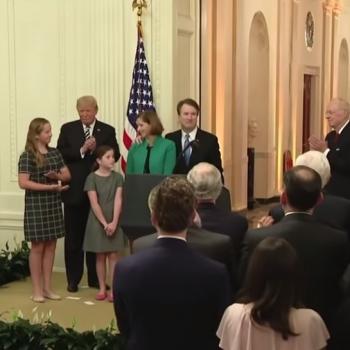I was reflecting today on the many different subjects I’ve written about over these past few months, and realized that while I’ve offered a lot of insights, and expressed numerous laments, I’ve been at an imbalance– forgetting to write about things which give me hope for American Christianity.
Today, I want to fix that.
I realize that it’s hard for readers to get to know the real me simply by reading my articles from afar, and that based on some of the subjects I’ve covered, it might be tempting to think that I’ve become just another cynic.
That, would be a tragic assumption.
The truth is, the entire reason why I spend my time reading, critiquing, writing, and in my brick and mortar life– teaching about God– is because I am incurably hopeful for the future of American Christianity.
Shocking, I get it. But, it’s true.
My relationship with American Christianity is like one of those relationships where you tolerate a mound of immature, obnoxious behaviors, because of potential you see in that person deep down– potential that is so valuable, you’re not willing to walk away from it. Sure, some days they drive you crazy and you question why it is that you keep investing in them, but in your heart of hearts you know that the potential you see is worth the hard work of character reformation.
This, is the relationship I have with the brand of Christianity we have here in Americaland.
Yet, with all of the frustrations and headaches this relationship gives me, at the end of the day I am filled with hope that a new chapter– a more beautiful chapter– in American Christianity is dawning.
So, here are 10 reasons why I am hopeful for the future of American Christianity:
1. We have a mixture of old-and-new movements cropping up, that are each inspiring, motivating, and engaging people.
Instead of the same, often stale expressions of Christianity our parents had, the reformation currently happening in American Christianity is producing some inspiring movements/new expressions of our faith, while also returning us to the beauty that can be found in historic tradition.
One of the most encouraging movements I’m seeing, is a return to and growth in, a modern Anabaptist movement. This is the tradition I most closely identify with, and believe it to be a breath of fresh air for anyone looking for a more counter-cultural, yet ridiculously relevant expression of faith. The Anabaptist tradition is the perfect blend of all this, and more. If you’re looking for something different but don’t want something recently invented, Anabaptist is where the party is happening. The fact that more and more people are finding this beautiful tradition, has me beyond enthusiastic for what the future of American Christianity might look like.
In addition to a renewal of the Anabaptist tradition, I’m also encouraged at the results of Emerging Christianity over the last several years. The Emergent discussion has been providing people a safe place to wrestle with their faith and has been engaging those who otherwise, might be left out of the big discussion on faith. Having safe space with my emergent friends was one of the keys that facilitated my reorientation of faith– something I discuss at length in my upcoming book.
2. Jesus and the GOP are going through a divorce, and I doubt there will be any re-marriages.
Growing up, as soon as you came forward to ask Jesus into your heart, you were practically given a voter registration card that already had the box for GOP checked off. Thankfully, this is less and less the case as people are beginning to realize that Jesus is so counter-cultural, that he doesn’t fit into any political party– GOP or otherwise. The fact that the next generation doesn’t see being a good Christian as synonymous to being a good republican, has me hopeful that not only will this divorce be permanent, but that there won’t be any marriages to any other political parties either.
3. We’re finally listening to voices from outside of our own cultural context.
Here in the west, we like to hear ourselves talk. Unfortunately, this has also been true in theology– giving primacy to western, male voices instead of a plurality of witnesses across the globe. More and more, both within the academy and without, we are recognizing the need to listen to theological contributions that originate outside of our own borders. These diverse theological and cultural contributions will continue to enrich our faith, in both theory and praxis.
4. The next generation cares about gender equality.
I believe the next generation of Christians will continue to make massive gains toward gender equality in our churches. One of the things which has hindered the forward progress of the American Church over the past few generations is that too many voices have been shut out– not because of lack of calling or lack of ability, but simply because they were born with the wrong genitals for leadership. I believe this next generation is beginning to understand and embrace that the Pauline epistles have been profoundly misapplied, and that we will see more and more pulpits filled by called and qualified women. This too, will deeply enrich our faith.
5.The next generation cares about social justice.
The justice factor is perhaps the item that has me most excited about the future of American Christianity. Whereas previous generations were more concerned with getting everyone into the boat before the end came, this generation believes that followers of Jesus must be engaged in a lifestyle of making the world a little less broken in the here-and now. If you want proof of just how big and inspiring the justice movement is becoming, you HAVE to attend The Justice Conference. What Ken Wytsma has done for the future of American Christianity through this conference is immeasurable. Though I’m sure he’s too humble to fully receive that, Ken’s contributions to the future of American Christianity are something future generations will long benefit from.
6. Jesus is as popular than ever, and we can build upon this.
As Dan Kimball pointed out in his 2007 book, They Like Jesus but not the Church, Jesus is more popular than ever. Even folks who have nothing to do with organized Christianity are still finding something compelling about the person of Jesus– and actually want to wrestle with what he taught. Since I’m in the business of telling people about the radical message of Jesus– because I actually want people to know and experience Jesus– this is the best news out there. The fact that this blog has a solid atheist following– people who don’t follow me as trolls, but as actual readers who engage with what I write, shows that while people might be turned off to Christians– they’re actually willing to interact with the teachings of Jesus.
You don’t get more set up for success than that.
7. The next generation is rediscovering that becoming a peacemaker is not an optional aspect of the Gospel.
They’re tired of all the war and violence– we’re tired of all the war and violence. While the previous generation would host events like “bring your gun to church day”, this generation is waking up to the understanding that becoming nonviolent peacemakers is a central requirement of actually being able to claim that you’re “following” Jesus. As they continue to get fed up with a violent society, and a faux Christianity which condones the use of violence, I believe we will see tides change and Christianity become a more legitimately counter-cultural force. This next generation, I believe, will have a majority who will stand against a violent, gun-culture, and instead will live lives dedicated to peacemaking.
8. Culturally diverse churches will become more and more the norm.
As Soong-Chan Rah points out in his book The Next Evangelicalism, immigrants are overwhelmingly saving a dying American Christianity. While across the country we have old, white congregations closing their doors because there isn’t a new generation behind them, we conversely see the immigrants coming into the country to be people who not just hold Christian values, but actively engage the church. This combination of stale, white religion dying off, while we have an infusion of enthusiastic Christian diversity, means that in time, diverse churches will become the norm. This new diversity will change the face of American Christianity in a million beautiful ways if we embrace it, and learn from each other– which, I believe we will.
9. Those typically considered outsiders, are finding more and more safe places where they can connect to God.
I believe this next generation has a heart for including the excluded. While historically many groups and classes of people have been pushed to the margins, I think the next generation of Christians will do a much better job at creating churches were we find the sign “All Are Welcome” to be more than an empty platitude. We’ve done a good job at creating places where we can connect with God, but I believe the next generation will create more and more safe places where the “other” can have a safe place to connect to God as well.
Jesus was all about inviting the excluded to come join him for dinner, and I think the next generation of Christians actually get that.
10. The next generation is rediscovering a holistic view of the atonement.
Finally, what is perhaps the most significant culture shift in American Christianity is the rediscovery of a holistic view of the atonement. While the previous generation most often understood the atonement in terms of a legal, penal transaction where Jesus was punished in our place, the current generation is beginning to understand that this view of the atonement is extremely limited at best. We’re now seeing a return to the classical view of the atonement, where instead of simply “paying our fine” as it is often over simplified, people are beginning to understand that on the cross, Christ was reconciling all of creation to himself. This larger view of the atonement is leading people to embrace the fact that we are invited to participate in the reconciliation of all things– the reconciliation of ourselves with creation, the reconciliation of broken social systems, the reconciliation of oppressive culture, etc. Developing a holistic view of the atonement means that people are less and less passing out tracts, and more and more people are finding ways to participate in what God’s doing in the world– reconciling everything. This simple but monumental shift in view will have positive impacts for individuals, entire communities, and the environment.
So, don’t ever get confused: I critique the cultural expressions of Christianity in America, because I believe there is a better day to come. I speak out to reform cultural expressions of the faith, because I believe there is enough raw potential hidden beneath our dysfunction, that we could change the world.
With all my heart, I believe that the best days in the history of American Christianity are in front of us– not behind us.
I believe.
I remain hopeful.
… and I won’t be giving up on this journey anytime soon.













